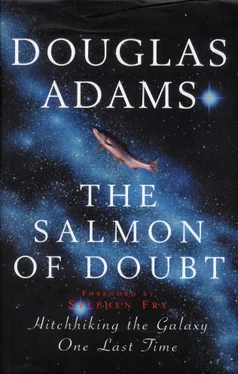Cookies This actually did happen to a real person, and the real person is me. I had gone to catch a train. This was April 1976, in Cambridge, U.K. I was a bit early for the train. I’d gotten the time of the train wrong, I went to get myself a newspaper to do the crossword, and a cup of coffee and a packet of cookies. I went and sat at a table. I want you to picture the scene. It’s very important that you get this very clear in your mind. Here’s the table, newspaper, cup of coffee, packet of cookies. There’s a guy sitting opposite me, perfectly ordinary-looking guy wearing a business suit, carrying a briefcase. It didn’t look like he was going to do anything weird. What he did was this: he suddenly leaned across, picked up the packet of cookies, tore it open, took one out, and ate it.
Now this, I have to say, is the sort of thing the British are very bad at dealing with. There’s nothing in our background upbringing, or education that teaches you how to deal with someone who in broad daylight has just stolen your cookies. You know what would happen if this had been South Central Los Angeles.
There would have very quickly been gunfire, helicopters coming in, CNN, you know ... But in the end, I did what any red-blooded Englishman would do: I ignored it. And I stared at the newspaper, took a sip of coffee, tried to do a clue in the newspaper, couldn’t do anything, and thought, What am I going to do?
We went through the whole packet like this. When I say the whole packet, I mean there were only about eight cookies, but it felt like a lifetime. He took one, I took one, he took one, I took one. Finally, when we got to the end, he stood up and walked away. Well, we exchanged meaningful looks, then he walked away, and I breathed a sigh of relief and sat back.
A moment or two later the train was coming in, so I tossed back the rest of my coffee, stood up, picked up the newspaper, and underneath the newspaper were my cookies. The thing I like particularly about this story is the sensation that somewhere in England there has been wandering around for the last quarter-century a perfectly ordinary guy who’s had the same exact story, only he doesn’t have the punch line.
From a speech to Embedded Systems, 2001
AND
EVERYTHING
Interview with the Onion A.V Club I think the idea of art kills creativity.
D.N.A.
THE ONION. You’ve got a lot of stuff going on. What do you want to talk about first?
Douglas ADAMS. I guess there are two main things. One is that we are imminently about to finish this thing that I’ve been laboring over for what seems like two years now, called Starship Titanic, which is a CD-ROM. It’s coming out in a couple months’ time. The other thing is that I’ve just agreed to the sale of Hitchhiker’s Guide to Disney. So I guess over the next couple of years, that’s what I’m going to be doing. I’m making that movie.
O. Tell me about Starship Titanic.
D.A. Well, it’s a CD-ROM, and the most important thing is that it started as a CD-ROM. People wanted me to do a CD-ROM of Hitchhiker’s, and I thought, “No, no.” I didn’t want to just sort of reverse-engineer yet another thing from a book I’d already written. I think that the digital media are interesting enough in their own right to be worth originating something in. Because, really, the moment you have any idea, the second thought that enters your mind after the original idea is “What is this? Is it a book, is it a movie, is it a this, is it a that, is it a short story, is it a breakfast cereal?” Really, from that moment, your decision about what kind of thing it is then determines how it develops. So something will be very, very different if it’s developed as a CD-ROM than if it’s developed as a book. Now in fact, I tell a slight lie, because the idea as such, in a sort of single-paragraph form, actually was what it was in one of the Hitchhiker books—I think Life, the Universe, and Everything. Because whenever I’d get sort of stuck on the story line in Hitchhiker, I’d always invent a couple of other quick story lines and give them to The Guide to talk about. So here was one little idea that was sitting there, and a number of people said to me, “Oh, you should turn that into a novel.” It just seemed like too much of a good idea, and I tend to resist those. But in fact I discovered there was a very good reason why I wasn’t interested in doing Starship Titanic as a book, which was that essentially it was a story about a thing. I just thought of this idea and didn’t have any people attached to it, and you can only really tell stories about people. So, later, when I was thinking “Okay, now I want to do a CD-ROM, because I want to justify the fact that I spend all my time sitting fiddling around computers,” I actually wanted to turn it into proper grown up work. So I was thinking, what would be a good thing? Then I suddenly remembered that the problem with turning Starship Titanic into a book—that it was about a thing, about a place, about a ship—suddenly became very much to its advantage. When you’re doing a CD-ROM, what you’re eventually going to create is a place, an environment.
reverse-engineer yet another thing from a book I’d already written. I think that the digital media are interesting enough in their own right to be worth originating something in. Because, really, the moment you have any idea, the second thought that enters your mind after the original idea is “What is this? Is it a book, is it a movie, is it a this, is it a that, is it a short story, is it a breakfast cereal?” Really, from that moment, your decision about what kind of thing it is then determines how it develops. So something will be very, very different if it’s developed as a CD-ROM than if it’s developed as a book. Now in fact, I tell a slight lie, because the idea as such, in a sort of single-paragraph form, actually was what it was in one of the Hitchhiker books—I think Life, the Universe, and Everything. Because whenever I’d get sort of stuck on the story line in Hitchhiker, I’d always invent a couple of other quick story lines and give them to The Guide to talk about. So here was one little idea that was sitting there, and a number of people said to me, “Oh, you should turn that into a novel.” It just seemed like too much of a good idea, and I tend to resist those. But in fact I discovered there was a very good reason why I wasn’t interested in doing Starship Titanic as a book, which was that essentially it was a story about a thing. I just thought of this idea and didn’t have any people attached to it, and you can only really tell stories about people. So, later, when I was thinking “Okay, now I want to do a CD-ROM, because I want to justify the fact that I spend all my time sitting fiddling around computers,” I actually wanted to turn it into proper grown up work. So I was thinking, what would be a good thing? Then I suddenly remembered that the problem with turning Starship Titanic into a book—that it was about a thing, about a place, about a ship—suddenly became very much to its advantage. When you’re doing a CD-ROM, what you’re eventually going to create is a place, an environment.
And the user becomes the character.
D.A. Yeah, exactly. Once the place begins to develop, you then put characters in it. But it isn’t about the characters, it’s about the ship. What I then wanted to do was something ... Well it was either very old-fashioned or very radical, depending which way you look at it; I wanted to build a conversation engine into the game. Years and years ago, I did a game based on Hitchhiker’s Guide with a company called Infocom, which was a great company. They were doing witty, intelligent, literate games based on text. You know, there are several thousand years of human culture telling you you can do quite a lot with text, and putting in the extra element of interactivity should just add to the possibilities. You turn the computer into the storyteller and the player into the audience, like in the old days when the storyteller would actually respond to the audience, rather than just having the audience respond to the storyteller. I had an enormous amount of fun, actually, working on that. I just loved constructing these virtual conversations between the player and the machine. So I just thought it’d be lovely to try to extend that and do more with it in a modern graphics game. Because what I would like to do is see if one can take that old conversation technology and make characters really speak. Put them in an environment and see where you go from there. So we started to tackle this problem of being able to speak to the characters.
Читать дальше










